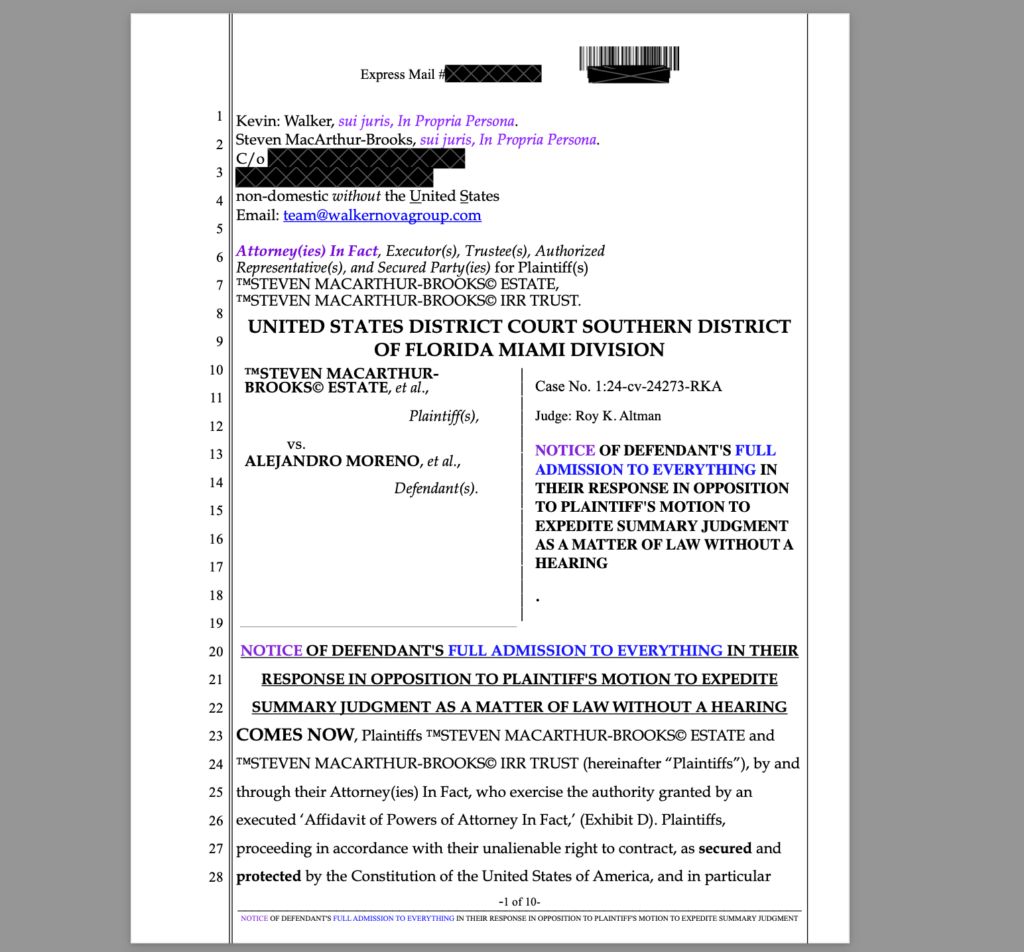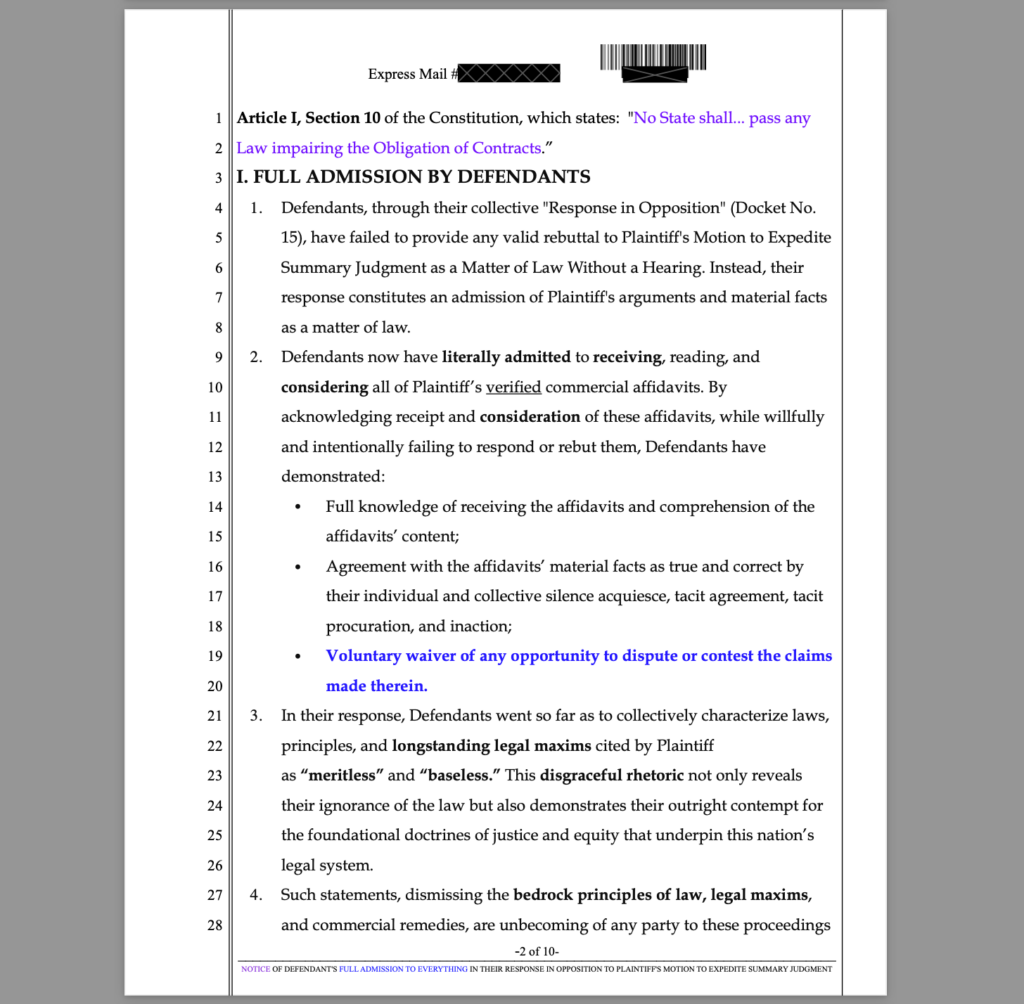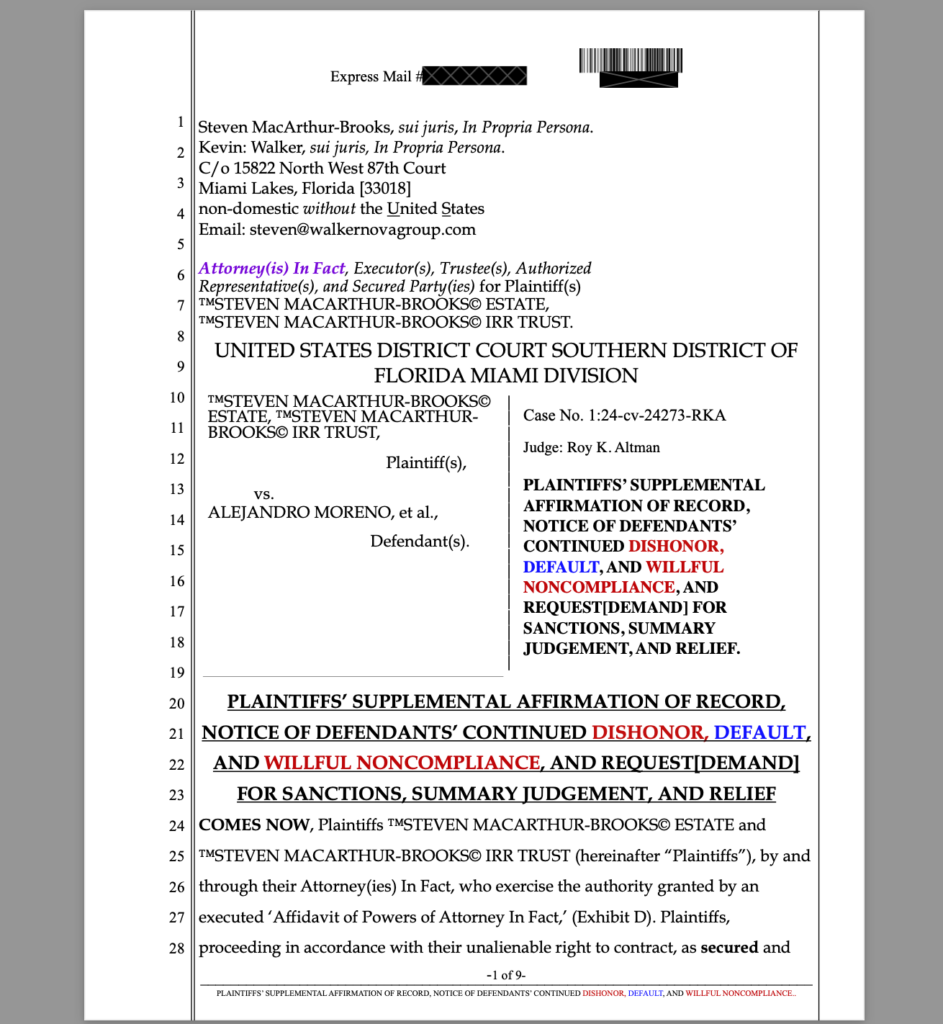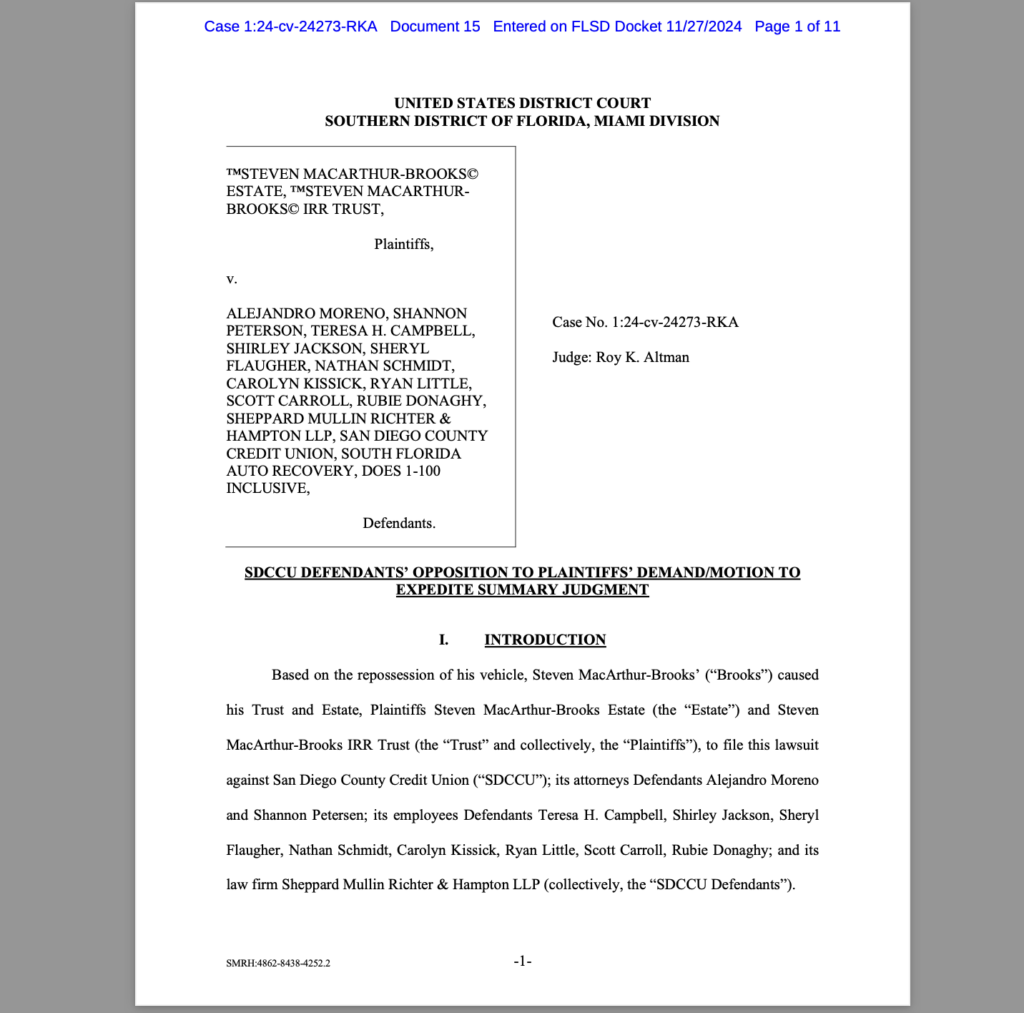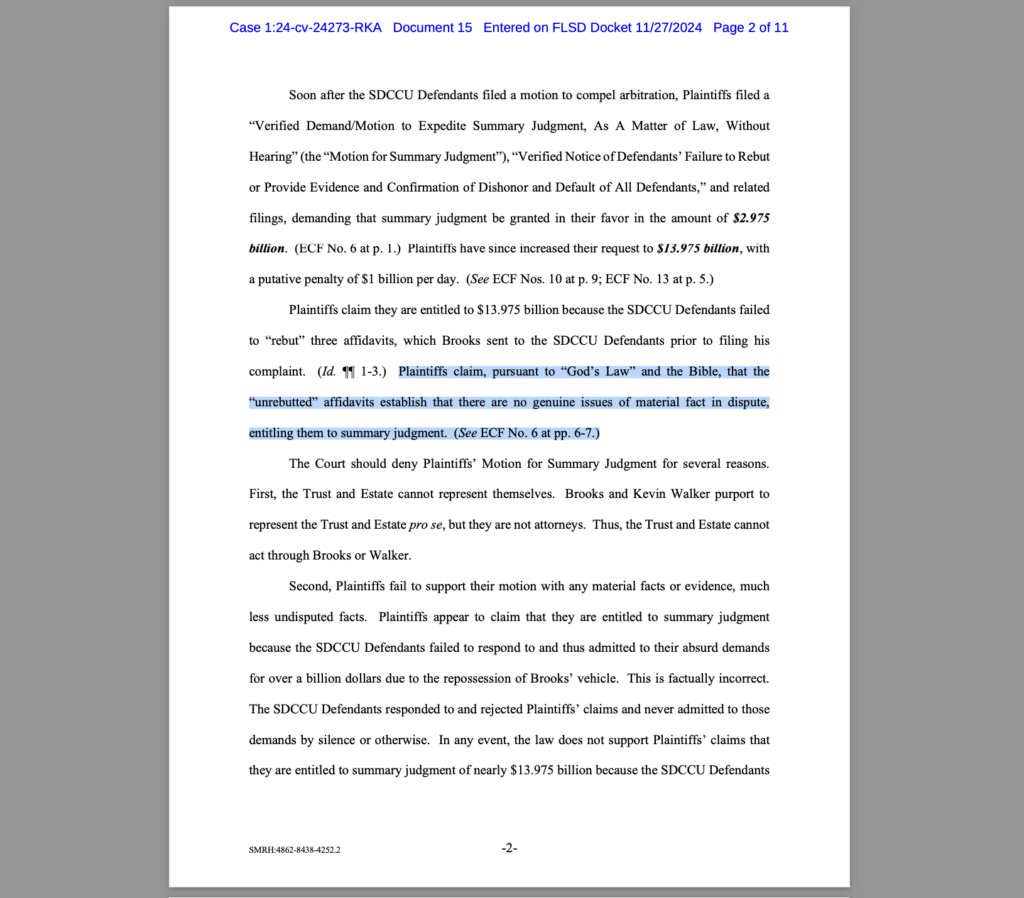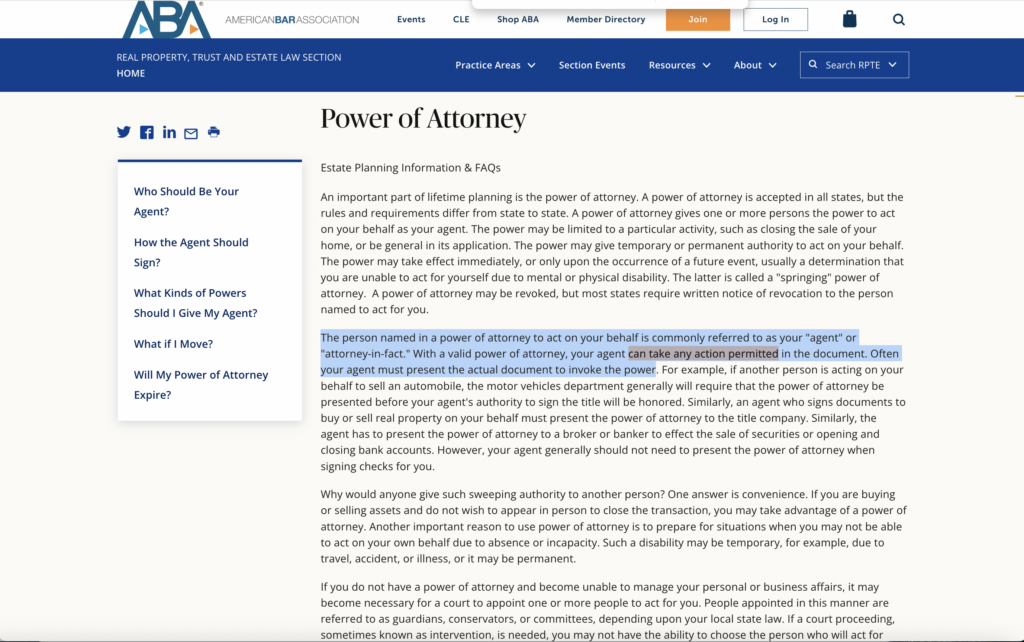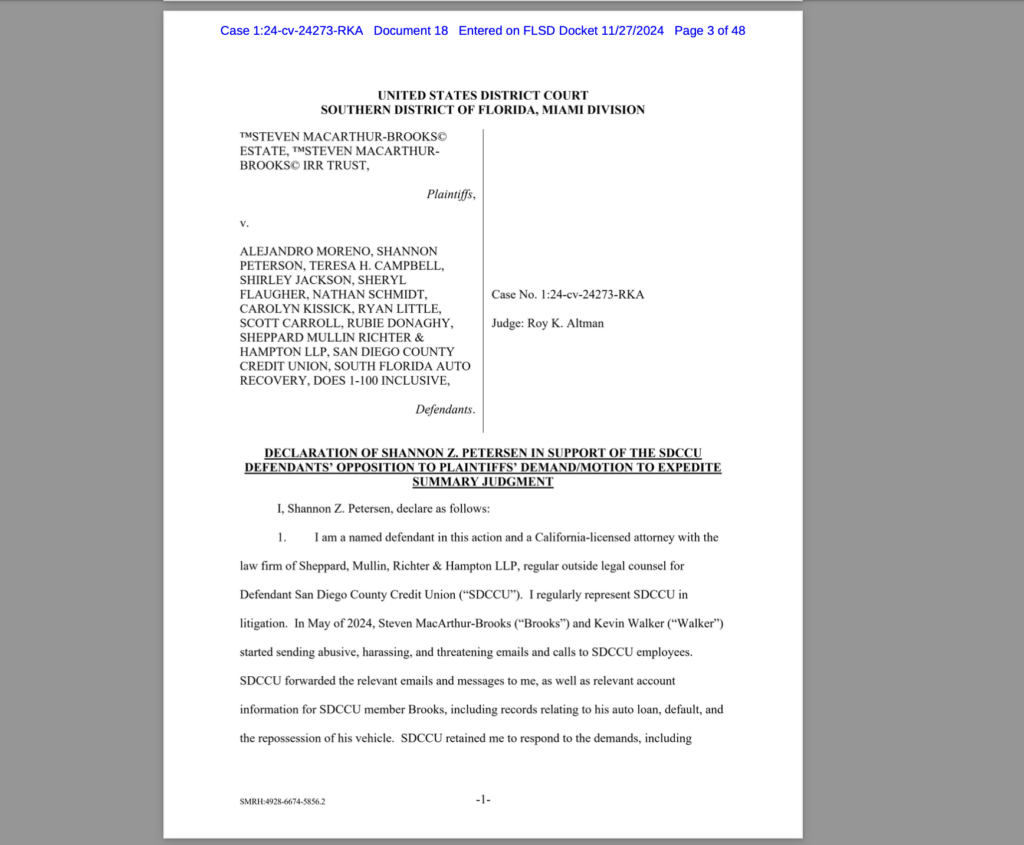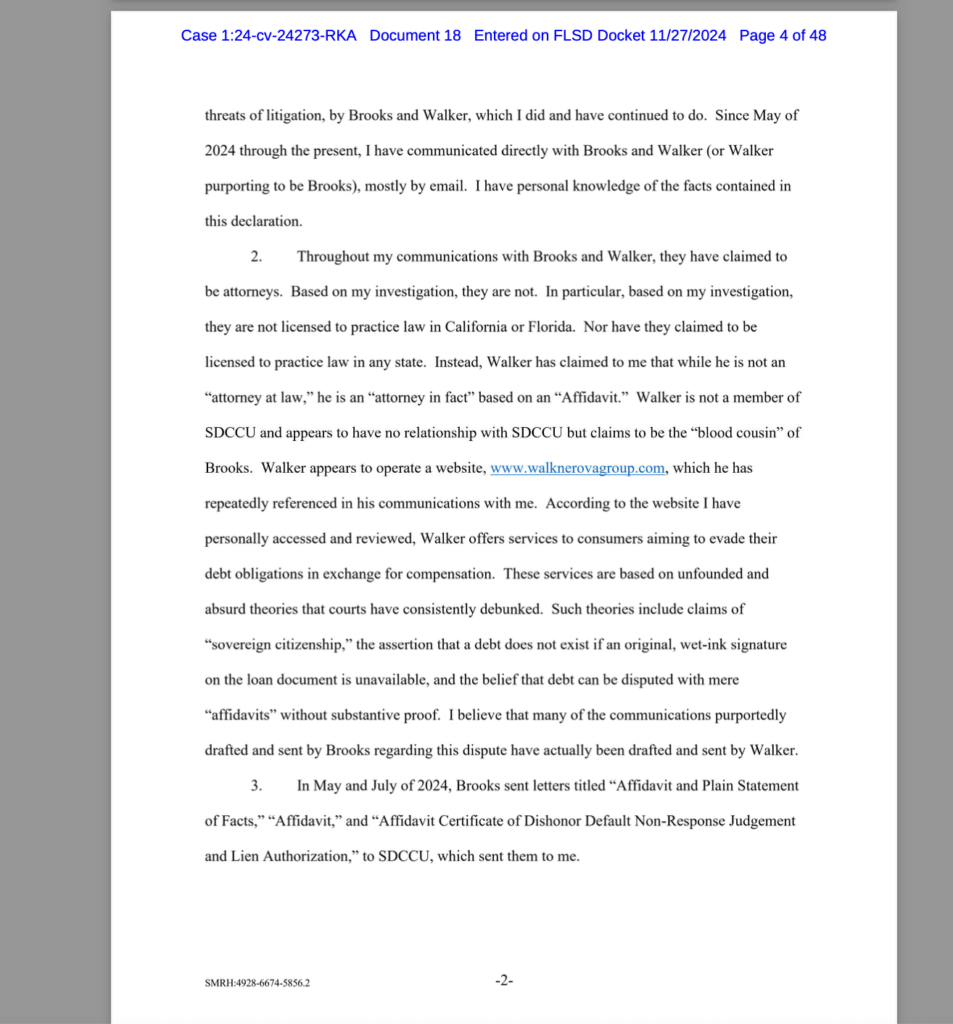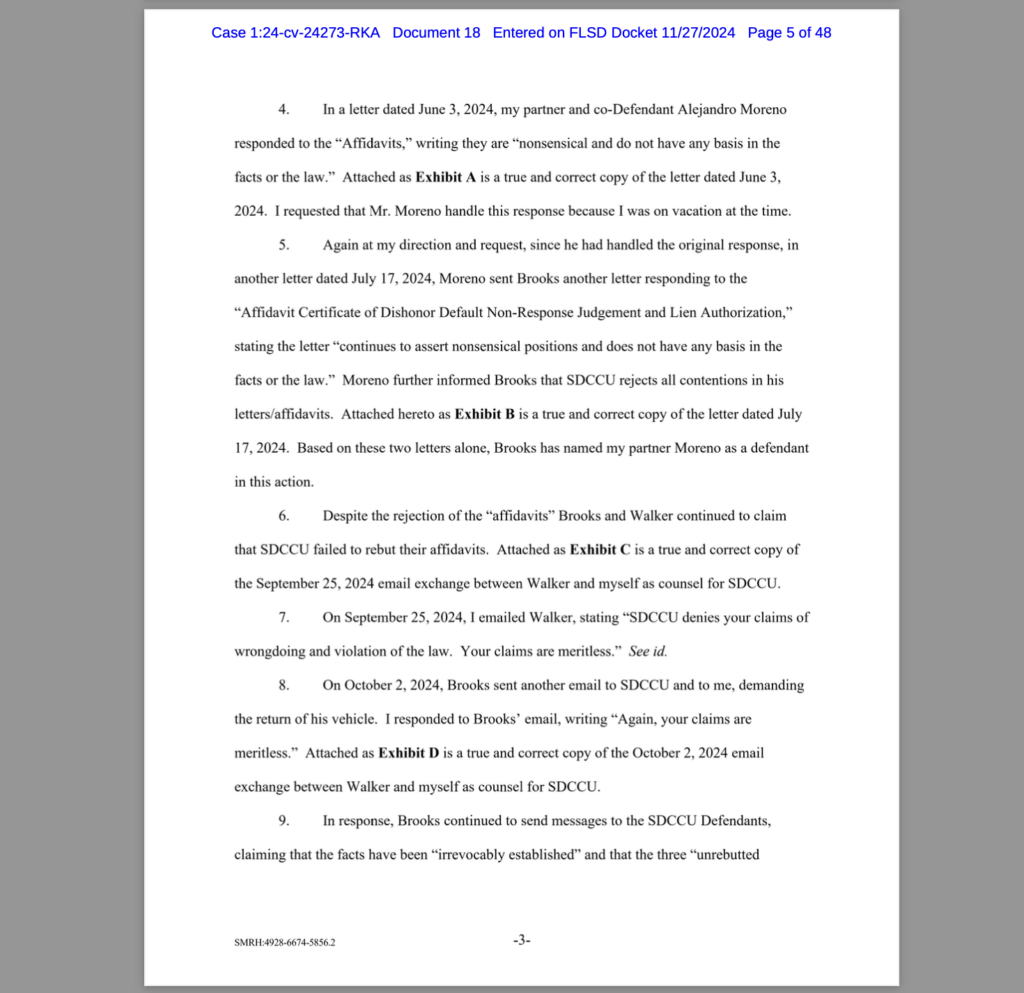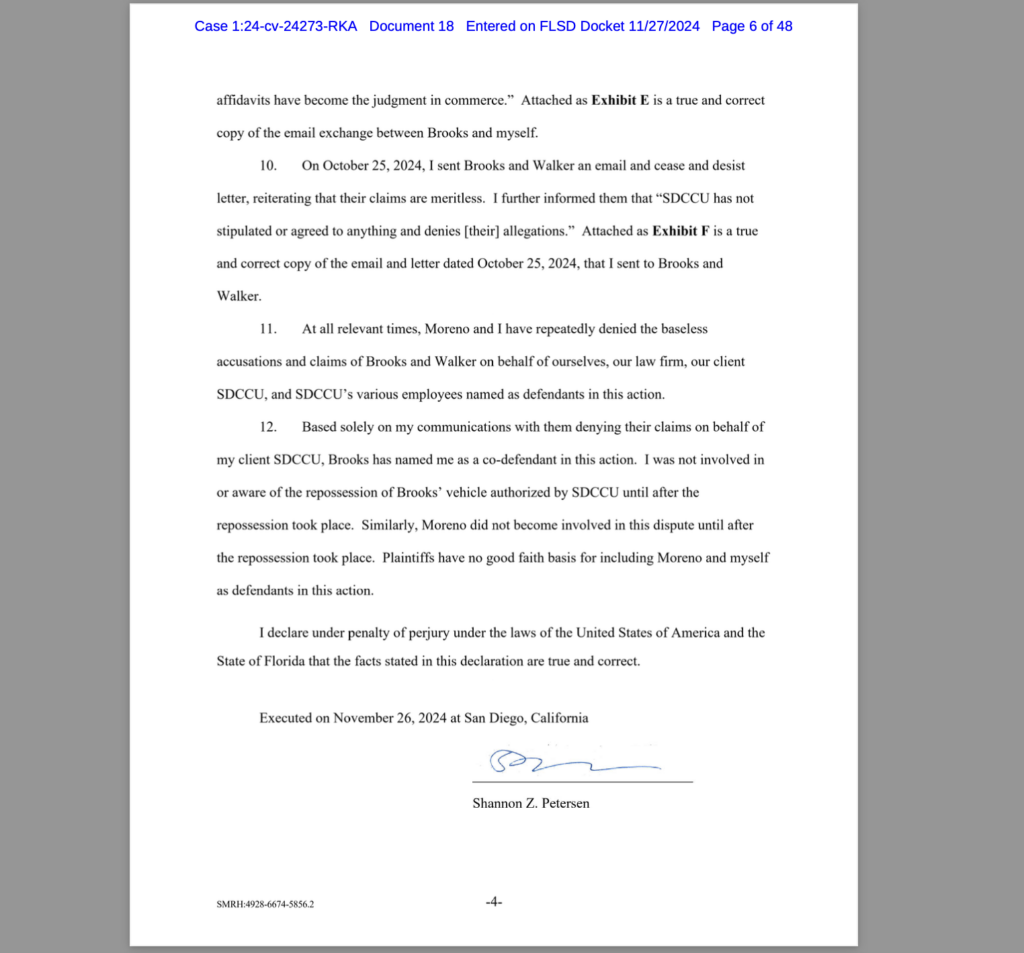
$16 Billion Lawsuit: Sheppard Mullin “Lawyers”/Defendants tell Judge Roy K. Altman Contract Law, the U.C.C., and Natural Law is “Meritless” and “Baseless”
In an eye-opening legal battle involving ‚ĄĘSTEVEN MACARTHUR-BROOKS¬© ESTATE and ‚ĄĘSTEVEN MACARTHUR-BROOKS¬© IRR TRUST (hereinafter ‚ÄúPlaintiffs‚ÄĚ), whom are represented by private attorney Kevin Walker and Steven MacArthur-Brooks, the principles of unrebutted affidavits and their binding nature have taken center stage. This case exposes not only the power of silence and incompetence but also the reckless disregard for legal procedure by the Defendants and “BAR” Attorneys Shannon Peterson and Alejandro Moreno. By their own words Shannon Peterson and Alejandro Moreno and Rylan Little and San Diego County Credit Union claim God’s Law, Natural law, contract law, Trust law, the United States Code, the Uniform Commercial Code, Common law, and/or Naural Law are “meritless” and “baseless” in Southern Florida Court with Judge Roy K. Altman.
Through their actions‚ÄĒand inactions‚ÄĒthe Defendants have turned what could have been a simple account setoff, settlement and full satisfaction of an obligation, into a prime example of incompetence, contempt of the law, War against the Constitution, fraud, extortion, coercion, treason, false pretenses, theft, robbery, and now even legal malpractice and dishonor.
Defendants’ Admission of Receipt and Consideration of Affidavits
From the outset, the Defendants openly admitted in their filings to receiving, reading, considering, and accepting all affidavits submitted by the Plaintiffs.
Despite their acknowledgment of these affidavits, they willfully and intentionally chose not to address or rebut the specific claims or material facts contained within. Instead, they resorted to dismissing the affidavits as ‚Äúmeritless‚ÄĚ and ‚Äúbaseless‚ÄĚ due to Defendants’ incompetence. This response highlights two critical failures:
- Incompetence in Addressing Legal Obligations: The Defendants’ blanket dismissal of the affidavits without providing point-by-point rebuttals is a glaring procedural failure. In commercial law, unrebutted affidavits stand as truth, and their decision to ignore this principle reveals a gross misunderstanding of their obligations.
- Implicit Admission of Truth: By failing to dispute the facts presented in the affidavits, the Defendants have legally conceded to every claim made by the Plaintiffs. Their response amounts to an admission of all material facts, leaving no room for defense.
DEFENDANTS IN DEFAULT AND DISHONOR
Defendants‚Äô continuous failure to rebut or respond to Plaintiffs‚Äô verified affidavits, despite clear acknowledgment of receipt, demonstrates their deliberate and willful default and dishonor in this case. By their own admission, Defendants have received, read, and considered all the affidavits presented by Plaintiffs. Yet, instead of offering substantive rebuttals or valid responses, they have opted for silence and vague claims, referring to the affidavits as ‚Äúmeritless‚ÄĚ and ‚Äúbaseless.‚ÄĚ This disregard for the facts and evidence put forth in the affidavits is not just an oversight but a conscious choice to dishonor the Plaintiffs‚Äô claims.
Under the Uniform Commercial Code (U.C.C. § 3-505), dishonor occurs when a party fails to fulfill its obligations, and it is clear that Defendants’ inaction constitutes a direct violation of this principle. Their refusal to address or rebut the material facts presented in the affidavits amounts to a tacit admission of the truth of Plaintiffs’ claims. Silence in the face of a well-documented, properly executed affidavit constitutes agreement to its contents, and by failing to respond, Defendants have entered into a binding acknowledgment of the facts asserted.
Furthermore, their blatant disregard for the Court‚Äôs order and failure to comply with procedural obligations only further demonstrates their default. The Court has already issued an order stipulating that Defendants‚Äô filings will be stricken for non-compliance, with the added sanction of penalties for their failure to act in good faith. This continued dishonor and defiance of legal proceedings only strengthens Plaintiffs’ position that they are entitled to the relief they seek, including summary judgment and sanctions against the Defendants for their bad faith conduct.
In essence, Defendants have not only failed to fulfill their contractual and legal obligations but have willfully chosen to dishonor their commitments, which has resulted in their default. This leaves Plaintiffs with no genuine dispute of material facts and reinforces their entitlement to judgment as a matter of law.
Defendants mocked God and the Law stating: 
Plaintiffs claim they are entitled to $13.975 billion because the SDCCU Defendants failed to ‚Äúrebut‚ÄĚ three affidavits, which Brooks sent to the SDCCU Defendants prior to filing his complaint. (Id. ¬∂¬∂ 1-3.) Plaintiffs claim, pursuant to ‚ÄúGod‚Äôs Law‚ÄĚ and the Bible, that the ‚Äúunrebutted‚ÄĚ affidavits establish that there are no genuine issues of material fact in dispute, entitling them to summary judgment. (See ECF No. 6 at pp. 6-7.)
Court’s Reprimand and Pending Sanctions
Adding insult to injury, the court has now stepped in to address the Defendants’ noncompliance and procedural dishonor. The court issued an order stating that:
- The Defendants’ filings will be stricken for failure to comply with procedural requirements.
- Sanctions will be imposed on the Defendants for their blatant disregard of the court’s directives and their legal responsibilities.
This court order underscores the severity of the Defendants‚Äô failures. Their inability‚ÄĒor unwillingness‚ÄĒto comply with basic legal standards is not only a disservice to their own case but also an insult to the judicial process.
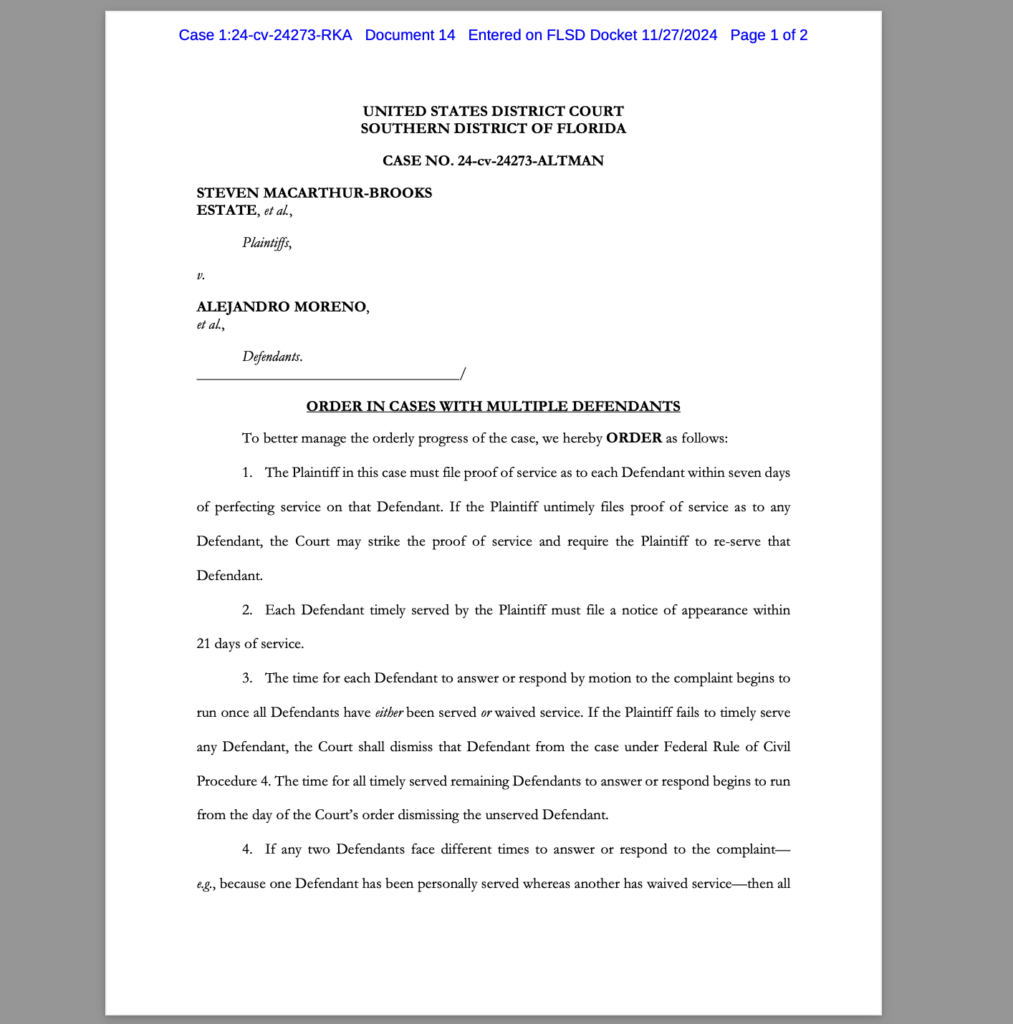
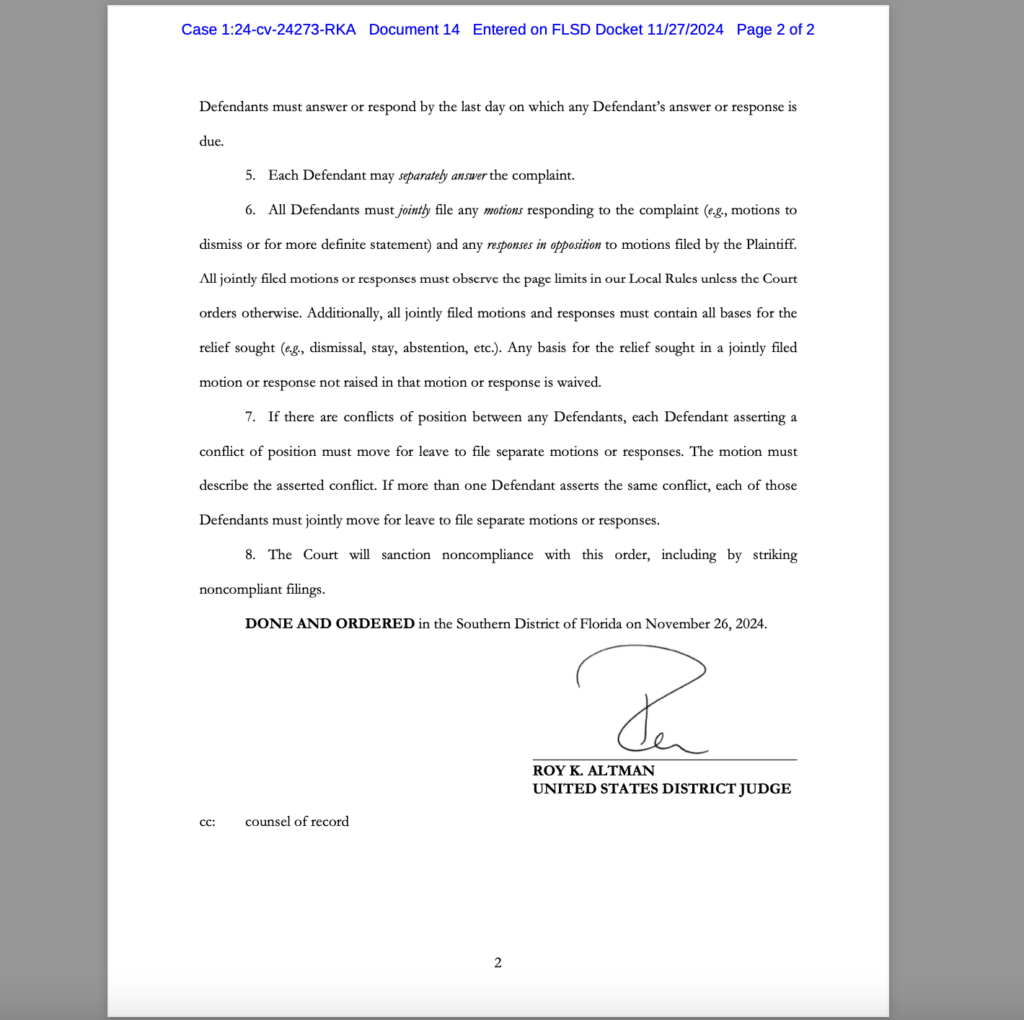
Good Faith Efforts by Plaintiffs Ignored
The Plaintiffs, acting in good faith and under constitutional protections, made multiple attempts to resolve the matter amicably. Their requests for the return of private Trust property‚ÄĒa¬†2018 GMC vehicle‚ÄĒwere met with silence and stonewalling. The Defendants‚Äô refusal to engage in good-faith discussions or restitution demonstrates bad faith, further compounding their violations.
Instead of addressing the claims with integrity, the Defendants engaged in procedural misconduct, dismissed valid legal instruments as ‚Äúbaseless,‚ÄĚ and arrogantly disregarded their obligation to rebut the affidavits in substance.
Defendants’ Procedural Dishonor: Silence and Noncompliance
The Defendants’ actions, or lack thereof, reveal a pattern of procedural dishonor:
- Failure to Rebut: In law and commerce, unrebutted affidavits stand as truth. The Defendants’ failure to rebut the affidavits point-by-point, as required, constitutes a tacit agreement to all claims presented by the Plaintiffs.
- Dismissal as ‚ÄúMeritless‚ÄĚ: Rather than engaging in a meaningful defense, the Defendants arrogantly deemed the affidavits ‚Äúmeritless‚ÄĚ and ‚Äúbaseless,‚ÄĚ further cementing their incompetence.
- Noncompliance with Court Orders: The Defendants ignored procedural rules, prompting the court to order their filings stricken and sanctions imposed. This blatant disregard for judicial authority is both reckless and indicative of their lack of credibility.
DEFENDANTS‚Äô ERRONEOUS FOCUS ON ‚ÄúPRO SE‚ÄĚ IS IRRELEVANT
Defendants‚Äô reliance on the ‚Äúpro se‚ÄĚ designation is not only a baseless mischaracterization but also an indication of their glaring incompetence. Plaintiffs, in fact, are lawful trusts represented by their ‚ÄėAttorney(ies) In Fact,‚Äô acting within the full scope of powers granted under an executed ‚ÄėAffidavit of Powers of Attorney In Fact.‚Äô This legal representation is clearly protected by the Constitution, particularly in upholding the right to contract. The Plaintiffs proceed ‚ÄėIn Propria Persona,‚Äô ‚ÄėSui Juris,‚Äô and not ‚Äėpro se‚Äô‚ÄĒa critical distinction that the Defendants fail to understand.
The Defendants‚Äô repeated references to irrelevant case law and misinterpretations of legal principles are nothing more than an attempt to distract from their own fundamental failure: their refusal to properly rebut or perform in accordance with their legal obligations. Their ignorance of the difference between ‚Äėpro se‚Äô and an ‚ÄėAttorney In Fact‚Äô is not only embarrassing but also a direct reflection of their incompetence. Even the BAR Association‚Äôs own website explicitly states that an ‚ÄėAttorney In Fact‚Äô has the legal capacity to perform any act within the authority granted in the power of attorney, which in this case is the ‚ÄėAffidavit of Attorney In Fact.‚Äô Therefore, the Defendants’ persistent and misguided focus on ‚Äúpro se‚ÄĚ serves only to further expose their inability to engage with the facts and law properly, undermining their credibility in the process.
BAR website LINK HERE:
The Defendants Shannon Peterson and Alejandro Moreno are BAR “Lawyers” and these are their own rules, yet they guide their “cleints” (SDCCU) down a path of frivolously arguing about “Pro Se” status, while the Plaintiffs’ documents and the record reflects they are being represented by their “Attorney(s) In Fact.”
Defendants‚Äô Status as ‚ÄėWards of the Court‚Äô
Compounding their failures is the Defendants‚Äô reliance on legal counsel, which under doctrines cited in¬†C.J.S. Attorney & Client, renders them ‚Äúwards of the court.‚ÄĚ This status underscores their inability to act autonomously in legal matters, further explaining their lack of competence and failure to uphold principles of good faith and fair dealing.
In this case, their dependency on representation, combined with their procedural missteps, has left them exposed and without recourse.
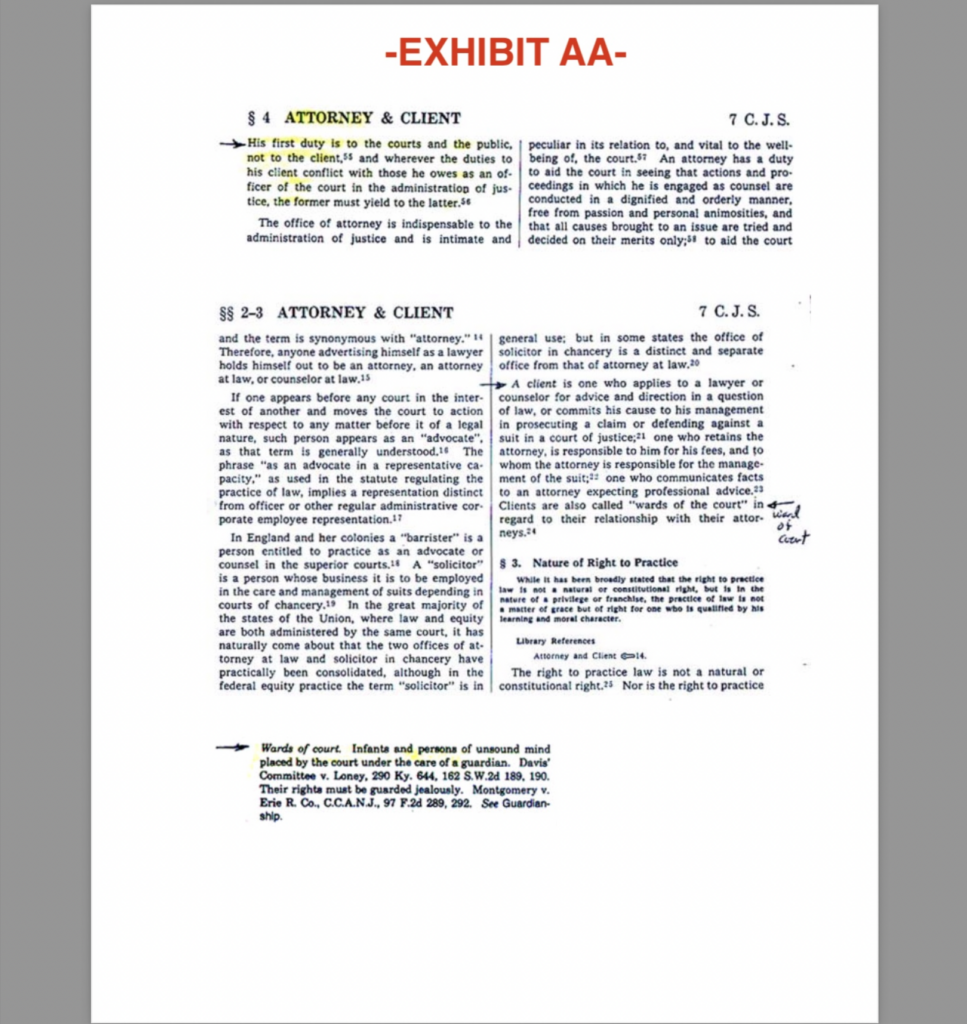
Entitlement to Judgment and Remedies
Given the Defendants’ procedural dishonor, bad faith, and failure to rebut, the Plaintiffs are entitled to the following remedies:
- Summary Judgement: With no genuine dispute of material facts, the Plaintiffs are entitled to a judgment in their favor. The unrebutted affidavits, combined with the Defendants’ admissions, provide irrefutable evidence.
- Sanctions: The Plaintiffs seek monetary sanctions under 28 U.S.C. § 1927, totaling $300,000,000 USD, to address the Defendants’ willful noncompliance and procedural misconduct.
- Default Judgement: The Defendants’ procedural failures warrant a default judgment, affirming the Plaintiffs’ claims as binding truth.
- Restitution: The Plaintiffs demand the return of their private trust property and compensation for all damages resulting from the Defendants’ unlawful actions.
Legal Principles Highlighted
The Defendants’ failings serve as a reminder of critical legal principles:
- Unrebutted Affidavits Are Binding: In law and commerce, failure to rebut an affidavit equates to agreement with its terms and claims.
- Silence Equals Consent: The Defendants’ lack of response constitutes acquiescence to the Plaintiffs’ claims.
- Procedural Honor Is Mandatory: Noncompliance with court orders and procedural rules leads to severe consequences, including sanctions and default judgments.
- Accountability Is Inevitable: The court’s decision to strike the Defendants’ filings and impose sanctions highlights the importance of adhering to legal standards.
Conclusion: A Warning to Litigants
This case should serve as a warning to anyone engaged in legal disputes. The Defendants’ procedural dishonor, failure to rebut affidavits, and noncompliance with court orders have not only destroyed their defense but also subjected them to significant legal and financial consequences.
The Plaintiffs’ unwavering commitment to asserting their rights under constitutional and commercial law, combined with the Defendants’ incompetence, has set a precedent that cannot be ignored.
For those navigating similar cases, the lesson is clear: respect the power of affidavits, comply with court orders, and never underestimate the consequences of silence and procedural dishonor.
Stay tuned as this case continues to unfold, demonstrating the importance of upholding legal principles in both law and commerce.

